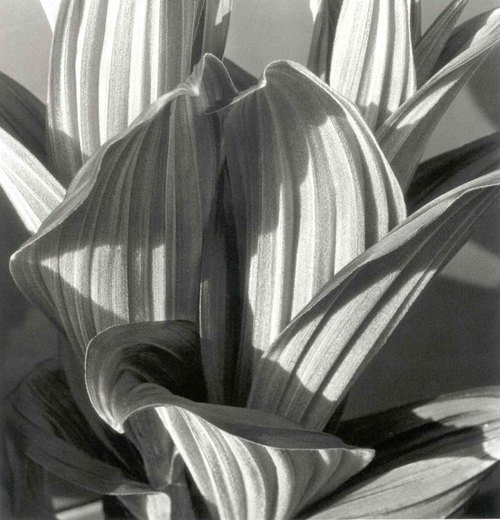Imogen Cunningham
dal 5/10/2006 al 3/11/2006
Segnalato da
5/10/2006
Imogen Cunningham
ArteF Galerie, Zurich
With a total of 40 photographs, the exhibition depicts a cross-section of the artist's multi-layered portfolio. Imogen Cunningham achieved fame with her poetic plant photographs and her sensitive portraits of prominent contemporaries, such as Gertrude Stein, Frieda Kahlo, Lionel Feininger or Hollywood stars like Cary Grant and Spencer Tracy.

For the first time in Switzerland, ArteF Fine Art Photography Gallery presents
selected works from the American "Grand Old Lady" of photography, Imogen Cunningham
(1883-1976). The exhibition premieres pictures from a private collection, which were
only recently discovered. They stem in part from her early, pictorialist phase and
have never before been publicly exhibited. With a total of 40 photographs, the
exhibition depicts a cross-section of the artist's multi-layered portfolio. Imogen
Cunningham achieved fame with her poetic plant photographs and her sensitive
portraits of prominent contemporaries, such as Gertrude Stein, Frieda Kahlo, Lionel
Feininger or Hollywood stars like Cary Grant and Spencer Tracy. These works, as well
as her then unconventional depictions of industry and architecture, made her name
known far beyond American shores.
Inspired by Gertrude Kasebier, Imogen Cunningham began to take photographs in 1901.
In connection with her chemistry studies, during which she was also intensively
occupied with botany, she worked in the studio of Edward S. Curtis and learned to
produce platinum prints. In 1909 she completed her training in photography at the
Technische Hochschule (Technical College) in Dresden. Once back from Europe, she met
Gertrude Kasebier and Alfred Stieglitz. In 1910 she opened her first studio in
Seattle - an immediate success.
Cunningham's creative phase, from 1901 to 1976, covers almost half of the time that
has passed since the invention of photography. Thus her work is also interesting
from a cultural perspective and in the context of art-history. Her pictures were
important stimuli for many photographers (Magarethe Maler, Edward Weston and Anselm
Adams amongst others). Her optical clarity quickly became recognized as an important
development in photography; she was often described as sensitive and perspicacious
at the same time.
Her sharply accentuated close-ups of plants and unconventional views of industrial
sites and modern architecture are mainly created in the 1920s. Concentrating on
light, form and abstract patterns, these photographs established her reputation as a
pioneer of photographic modernism. She is a founder member of the f/64 group and
continues to develop her style and techniques over the course of 70 years. Thus in
the 30s and 40s she transfers the style of her plant photography to portrait
photography and creates impressive portraits, full of precision. Her pictures of the
dancer Martha Graham for Vanity Fair in 1932 establish her reputation as the
foremost portraitist of her time. Between 1932 and 1934 she works for the magazine
regularly in New York and Hollywood. In the 50s Cunningham stretches her work in an
almost post-modern way. She photographs people and plants, and places the negatives
on top of one another in order to abstract her portraits. With the aid of double
flash she produces a collection of psychologically impressive still-lifes. Many of
her street photographs from the 60s demonstrate a connection with Dadaism and
further developments in performance art. She spends the last years of her life in a
photography studio on age. The profound yet lively portraits of old people are
collected in the book "After Ninety", published posthumously.
Cunningham was interested in the possibilities of storytelling and representation
through the medium of photography. Most important for her was the possibility,
through this medium, of bringing the photograph, object and viewer closer to one
another. This task she allocated to the purely visual elements of photography: form,
tonality and shading. Her mastery of nearly every photographic genre results from
her knowledge of the formal elements of photography. Her observation of form leads
to pictures which immerse themselves in each subject and, like lyric poetry, arouse
emotions. Imogen Cunningham knew that it is the details and the particular
arrangement of formal elements which the biggest personalities, the most beautiful
flowers and the most dramatic events display best of all. Time and again,
persistently, she explored this relationship between the flexible world of
experience and the formal world of photography, with intensity and with poetry.
Vernissage: Thursday October 5th, 6-8 pm
ArteF Galerie
Splugenstrasse 11 - Zurich
Opening hours: Tues-Fri 1pm - 6pm Sat 11pm - 4pm



